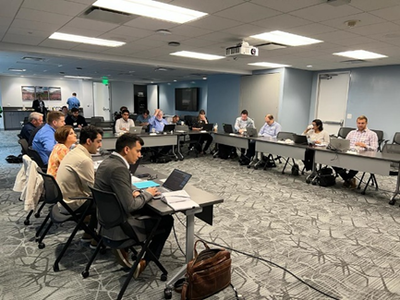ESRI and NTSB cohost forums for professionals dedicated to battery safety science research

Since 2015, the Electrochemical Safety Research Institute (ESRI) has co-chaired Battery Safety Council (BSC) forums with the National Transportation Safety Board (NTSB). Over a dozen forums have been organized on various topics related to battery safety.
Participants in these groups include representatives from industry, government, academia, and other organizations who are dedicated to advancing and disseminating battery safety science research and the lessons learned to benefit public safety. These invitation-only forums facilitate technical discussions and deliberations while fostering candid and open discussions among individuals who are knowledgeable about the field.
In 2024, BSC Forum 14 was held in Washington D.C. from Oct. 22-23. ESRI leaders, along with experts from the battery and energy storage fields, will discuss “Critical Variables to Assess if a Battery Is Safe.”
Battery Safety Council Forum 13: Implications of Fast Charging Li-ion Batteries on Performance and Safety
During our Battery Safety Council forum in June 2023, we discussed challenges, safety hazards, and considerations related to fast charging, as well as insights gleaned from research, with speakers and attendees.
EV customers get “range anxiety” and worry they’ll run out of battery while driving and be stuck somewhere on the road charging for hours. Charging stations that allow you to fast charge the Li-ion batteries in your EV can help to address these worries, but there are significant areas of concern to solve regarding performance constraints and safety ramifications.
What are some concerns about fast charging Li-ion batteries?
Although fast charging can decrease the time it takes to charge an EV and help with drivers’ range anxiety, there are challenges at multiple scales for batteries, from material to pack level, as well as on the charging infrastructure. Accelerated degradation incurred due to the high charging rates, reduced capacities, lithium-plating, and safety hazards that can lead to thermal runaway need to be addressed.
Fast charging can also have detrimental effects on cell degradation and safety. Accelerated growth of the solid electrolyte interphase (SEI) layer on the anode, mechanical deformations of electrode particles, and lithium plating may occur due to repeated charging at high rates in lithium-ion batteries. The safety of the cells may be affected due to increased cell impedances and lower thermal stability. Loss of active lithium inventory and electrolyte degradation due to increased SEI growth may decrease thermal stability. Studies to quantify the effects of fast charging on long-term safety are also important as we consider them for secondary applications via reuse and recycling.
If you are interested in learning more about Battery Safety Council forums, please contact ESRI Event Lead Meghan Leyva.
Stay informed
Sign Up for Updates
Knowledge and awareness about potential hazards associated with scientific innovations help in minimizing risks and promote best practices that improve safety. Sign up to learn more about our initiatives, partnerships, upcoming events, and free resources.
By submitting this form, I am opting in to receive communications from UL Research Institutes (ULRI) containing news and updates about its work and initiatives. I understand that I can manage my preferences at any time and agree to ULRI’s online policies.